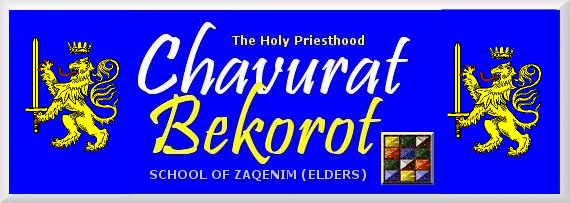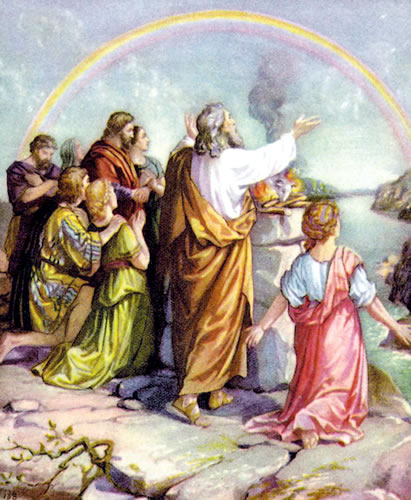

25
OLD TESTAMENT ESSAYS
 The Importance of the
The Importance of the
Covenant Idea in the Period
Genesis 1 to 1 Kings 12
(2 January 1984)
by Christopher C. Warren, M.A.(Oxon)

There are four main covenants associated with the period Genesis 1 to 1 Kings 12:
- 1. The Pre-Diluvian Noahic Covenant;
- 2. The Post-Diluvian Noahic Covenant;
- 3. The Abrahamic Covenant; and
- 4. The Mosaic Covenant.
1. The Pre-Diluvian Noahic Covenant
Because of the corruption on the earth at the time of Methuselah, lamech, and Noah, Yahweh diced to destroy the earth with its inhabitants, sparing only eight righteous souls, by instructing Noah to build an ark, taking on board his family and representatives of the animal kingdom. The covenant established between Yahweh and Noah was a sovereign's dispensation of grace, namely Yahweh's; Noah would build an ark and embark animals, and Yahweh would save Noah's family.
2. The Post-Diluvian Noahic Covenant
The Post-Diluvian Noahic Covenant demonstrates more clearly than any other instance what the essential nature of a covenant is, showing that it was not a contract between two parties. It was not a bilateral agreement. Yahweh establishes the covenant with Noah - it is totally unilateral. The covenant is:
- a. Conceived and established by Yahweh Himself;
- b. Universal in scope, embracing not only Noah but all his descendants and every living creature;
- c. Unconditional; no commandment or requirement is added - thus there was no possible way in which Noah could 'break' the covenant. There aren't even any ordinances that Noah is supposed to follow. The presence of the bow in the sky following the recession of the flood was simply to prove Yahweh's faithfulness to Noah, and to remind mankind of Yahweh's undeserved kindness to them; and, lastly, the coventant is:
- d. Everlasting; therefore there is no uncertainty about the covenant.
3. The Abrahamic Covenant
The same basic covenant ideas are found in the Abrahamic Covenant. These may be divided into:
4. The Mosaic Covenant
The Mosaic Covenant was made with Israel as a people whom Yahweh had specifically chosen to love, redeem, and adopt as His own. Yahweh chose the people, the people did not choose Him. The Mosaic Covenant was made with Israel following on from, and in fulfilment of, the Abrahamic Covenant. The spiritual relationship which is at the centre of the Abrahamic Covenant is at the centre of the Mosaic one too: "And I will take you to Me for a people, and I will be to you an Elohim (God); and you shall know that I am Yahweh your Elohim (God)" (Ex.6:7; cp. Dt.29:13). Like the three previous covenants this one shows that sovereign dispensation is at the forefront.
Though the Mosaic Covenant placed many obligations upon the Israelites, it was not a contract between two parties in the strictest sense. It was not a bilateral agreement or treaty; if anything, it resembled more a treaty between a conqueror and the conquered. Israel had no 'rights', only obligations. It is therefore rightly compared with contemporary Hittite treaties between the sovereign nation (the Hittite Empire) and the conquered nation(s).
The Mosaic Covenant expected of Israel an intimate relationship with Yahweh as did the Abrahamic. Holiness (set-apartness) was an integral aspect of the covenant blessing. Israel had been redeemed to be a holy (set-apart) people, which means they were separated from the rest of the world to become Yahweh's sovereign possession.
The Covenant Idea, now expressed in Mosaic Terms, was integral to Israelite life after Moses had died and up to the time of David and Solomon. Joshua spelled out the covenant, or reaffirmed it, first by circumcising Israel at Gilgal, and then, following the conquest (and during it), by reading out the Law at Mounts Ebal and Gerizim, and shortly before his death. The Covenant Idea cemented the nation of Israel together, separated them from the other nations, raught them correct principles especially concerning Yahweh's sovereignty.
Brief mention should perhaps be made of the so-called 'Davidic Covenant' since it is implied in 2 Sam.7:12-17 though not stated. It is essentially messianic in its ultimate reference. In term's of Yahweh's sovereign grace, the 'Davidic Covenant' is no different from the Mosaic or Abrahamic.


This page was created on 13 August 2009
Updated on 13 August 2009
Copyright © 1987-2009 NCCG - All Rights Reserved



